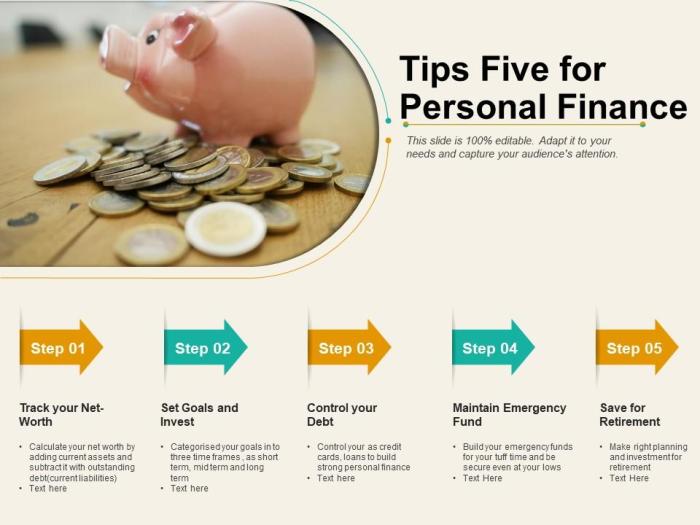Kicking off with Personal Finance Tips, get ready to level up your money game with these expert strategies. From budgeting to investing, we’ve got you covered with all the tips and tricks you need to secure your financial future.
Whether you’re a high school student or a seasoned adult, mastering personal finance is key to success in today’s world. Let’s dive in and learn how to make the most of your money!
Importance of Personal Finance
Personal finance is crucial for individuals as it involves managing your money, budgeting, saving, investing, and planning for the future. Developing good financial habits can have a positive impact on various aspects of life, while poor financial management can lead to significant consequences.
Examples of How Good Personal Finance Habits Can Positively Impact One’s Life
- Building a strong financial foundation can provide a sense of security and peace of mind.
- Properly managing finances can help individuals achieve their short-term and long-term financial goals.
- Saving and investing wisely can lead to financial growth and wealth accumulation over time.
- Having a solid financial plan in place can help individuals weather unexpected financial emergencies.
Consequences of Poor Financial Management
- Accumulating debt and paying high interest rates can lead to financial stress and constraints.
- Living beyond one’s means can result in a cycle of debt and financial instability.
- Not saving for the future can leave individuals unprepared for retirement or unforeseen expenses.
- Missing bill payments or defaulting on loans can damage one’s credit score and financial reputation.
Budgeting Tips
Budgeting is a crucial aspect of personal finance that helps individuals manage their money effectively. By creating and sticking to a budget, you can ensure that you are spending within your means and working towards your financial goals. Here are some practical tips to help you with budgeting:
The 50/30/20 Rule
The 50/30/20 rule is a popular budgeting method that can help you allocate your income effectively. According to this rule, 50% of your income should go towards needs such as rent, groceries, and utilities, 30% towards wants like dining out and entertainment, and 20% towards savings and debt repayment. This rule provides a clear guideline for managing your expenses and prioritizing savings.
Tracking Expenses
One of the most important steps in budgeting is tracking your expenses. By keeping a record of where your money is going, you can identify areas where you may be overspending and make necessary adjustments. This can help you stay on track with your budget and make informed decisions about your finances.
Saving Strategies

When it comes to saving money effectively, there are various strategies that can help you reach your financial goals. One important concept to keep in mind is paying yourself first, which means prioritizing saving before spending. Additionally, automating your savings can make it easier to consistently set money aside for the future.
Different Ways to Save Money Effectively
- Set up automatic transfers to a separate savings account each time you get paid.
- Create a budget and track your expenses to identify areas where you can cut back.
- Take advantage of discounts, coupons, and cashback offers when making purchases.
- Consider setting up a retirement account, such as a 401(k) or IRA, to save for the long term.
Paying Yourself First
- Allocate a percentage of your income towards savings before covering your expenses.
- Treat your savings contribution as a non-negotiable bill that must be paid each month.
- Start small if necessary and gradually increase the amount you save over time.
Automating Savings
- Set up automatic transfers from your checking account to your savings account on a regular schedule.
- Use apps or online tools that round up your purchases to the nearest dollar and deposit the spare change into savings.
- Consider enrolling in employer-sponsored retirement plans that deduct contributions directly from your paycheck.
Debt Management
Managing debt is a crucial aspect of personal finance. By efficiently paying off debt, individuals can improve their financial health and work towards achieving their financial goals.
Strategies for Paying Off Debt Efficiently, Personal Finance Tips
When it comes to paying off debt, it’s essential to have a plan in place. Here are some strategies to help you pay off debt efficiently:
- Create a budget to track your income and expenses.
- Identify high-interest debts and prioritize paying them off first.
- Consider consolidating multiple debts into one lower-interest loan.
- Increase your income through additional work or side hustles to allocate more towards debt repayment.
- Avoid taking on new debt while working on paying off existing debt.
Snowball vs. Avalanche Method for Debt Repayment
Two popular methods for debt repayment are the snowball and avalanche methods. Each has its own benefits and can be effective in helping you become debt-free:
- Snowball Method: This method involves paying off the smallest debt first, regardless of interest rate, then moving on to the next smallest debt. This can provide a sense of accomplishment and motivation as debts are paid off quicker.
- Avalanche Method: With this method, you focus on paying off debts with the highest interest rates first, then moving on to the next highest. This can save you money on interest payments in the long run.
Tips on Negotiating with Creditors to Reduce Debt
When facing challenges with debt repayment, don’t hesitate to negotiate with your creditors. Here are some tips to help you reduce your debt through negotiations:
- Communicate with your creditors early if you anticipate difficulties in making payments.
- Be honest about your financial situation and provide any supporting documentation if needed.
- Propose a repayment plan that you can realistically afford.
- Ask for lower interest rates or a reduction in the total amount owed.
- Consider working with a credit counseling agency for professional assistance in negotiating with creditors.
Investment Basics
Investing is an essential aspect of personal finance that can help individuals grow their wealth over time. By understanding different investment options, the importance of diversification, and tips for beginners, you can make informed decisions to secure your financial future.
Overview of Different Investment Options
- Stocks: Investing in shares of a company, giving you ownership and the potential for capital appreciation and dividends.
- Bonds: Loaning money to governments or corporations in exchange for periodic interest payments and the return of the principal amount.
- Mutual Funds: Pooled funds from multiple investors, managed by professionals, offering diversification across various assets.
- Real Estate: Investing in properties for rental income or capital appreciation.
Importance of Diversification in an Investment Portfolio
Diversification involves spreading your investments across different asset classes to reduce risk. By not putting all your eggs in one basket, you can mitigate the impact of market fluctuations on your portfolio. As the famous saying goes, “Don’t put all your eggs in one basket.”
Tips for Beginners Looking to Start Investing
- Start with a clear investment goal and timeframe in mind.
- Educate yourself about different investment options and their associated risks and returns.
- Consider starting with low-cost index funds or ETFs for broad market exposure.
- Regularly review and rebalance your portfolio to align with your financial goals and risk tolerance.
Retirement Planning: Personal Finance Tips
Planning for retirement is crucial to ensure financial stability in your golden years. Early retirement planning can make a significant difference in the amount you can save and invest for the future. It allows you to take advantage of compounding interest and grow your retirement fund over time.
Retirement Account Options
- 401(k): A retirement account sponsored by an employer that allows you to contribute a portion of your salary before taxes. Employers often match a percentage of your contributions, helping your savings grow faster.
- IRA (Individual Retirement Account): A personal retirement account that offers tax advantages. There are different types of IRAs, including Traditional IRAs and Roth IRAs, each with its own set of rules and benefits.
Calculating Retirement Savings Goals
- Start by estimating your annual retirement expenses, including housing, healthcare, and leisure activities.
- Consider factors like inflation and life expectancy when determining how much you’ll need in retirement.
- Use the following formula to calculate your retirement savings goal:
(desired annual retirement income) x (25)
- Adjust your savings goal based on your current age, expected retirement age, and investment returns.
Emergency Fund

In times of unexpected financial setbacks like a car repair or medical emergency, having an emergency fund can be a lifesaver. It provides a cushion to fall back on without having to rely on credit cards or loans, which can lead to debt.
Importance of Having an Emergency Fund
An emergency fund serves as a financial safety net, offering peace of mind knowing that you have funds set aside for unexpected expenses. It can help you avoid going into debt, maintain financial stability, and cope with financial emergencies without disrupting your long-term financial goals.
Determining the Right Amount to Save for Emergencies
To determine the right amount for your emergency fund, consider factors like your monthly expenses, job stability, health status, and any potential major expenses on the horizon. Aim to save at least 3-6 months’ worth of living expenses in your emergency fund to cover a range of unexpected situations.
Tips for Building and Maintaining an Emergency Fund
- Set a specific savings goal for your emergency fund and automate regular contributions from your paycheck or bank account.
- Keep your emergency fund in a separate account, like a high-yield savings account, to prevent easy access for non-emergencies.
- Reassess and adjust your emergency fund savings goal as your financial situation changes, such as getting a raise or experiencing a major life event.
- Use windfalls like tax refunds or bonuses to boost your emergency fund rather than splurging on unnecessary expenses.


